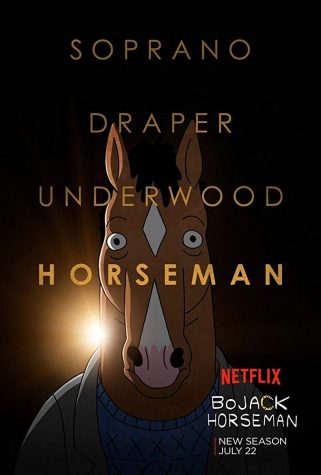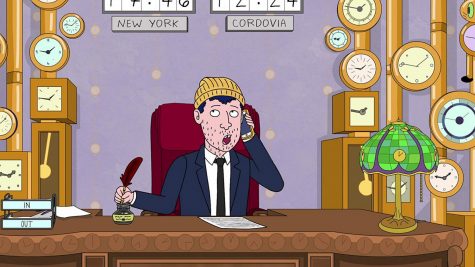“Bojack Horseman” Matures Like Its Characters
One of the best shows on Netflix ended in January, finally available to binge without grueling waits between seasons. And the waits were grueling. Not because the writers ended the finales on suspenseful cliffhangers, but because they ended them without closure — a response to three-camera sitcoms (think “Full House”).

“I … think it’s important to kind of keep reminding the audience that BoJack is a cautionary tale, not a role model,” said Raphael Bob-Waksberg, creator of Bojack Horseman. On the season three poster, Bojack Horseman was compared to some of TV’s most villainous men.
Juxtaposed with the world of “Bojack Horseman” — where depression, addiction, and abuse are prevalent — the sitcom’s failure to reflect reality is obvious. “You just want to watch a show about good, likeable people who love each other,” says Bojack Horseman (voiced by Will Arnet) in the first episode. “Where no matter what happens, at the end of 30 minutes, everything’s gonna turn out okay.”
So instead of feeding into the comforting and indulgent narrative that everything will “turn out okay,” “Bojack Horseman” ends its seasons without closure, with Bojack leaning against a guardrail, staring across Hollywoo(d). Empty. And when it provides closure — like in the series finale — it’s an honest kind of closure.
A friend scrunched their nose at the idea of watching a cartoon. “I just can’t connect to animated characters,” they said, expecting an animated comedy starring anthropomorphic animals alongside humans to be wacky — simply a comedy with funny gags and goofy characters. While “Bojack Horseman” nails those comedic elements, it shines brightest when it explores humanity. Its writing swaps between gut-busting comedy and heart-wrenching drama in the same minute. The writers load their characters and themes with nuance, not to show off the level of critical thought they’re capable of but because those characters and topics deserve the complexity they’re given. And like their constantly-evolving characters, their message on sitcoms grows as the show progresses.
In the final season, a character approaches Bojack and says that he wasn’t a fan of sitcoms but that his brother cracked up whenever he watched Horsin’ Around (the fictional “Full House” that Bojack starred in). His brother passed, but now whenever Horsin’ Around plays, he remembers his laugh.
The show’s message evolved from satirizing sitcoms to empathizing with their importance. The writers may dislike sitcoms, but they understand their impact. This isn’t an outlier. Throughout the show, the writers take responsibility for the power they hold as storytellers.

One of the show’s goofier characters, Todd Chavez, finds himself running a company called What Time is it Right Now? Todd provides much of the comedy that operates in tandem with the show’s more serious side.
“I … think it’s important to kind of keep reminding the audience that BoJack is a cautionary tale, not a role model,” said Raphael Bob-Waksberg, creator of “Bojack Horseman.”
While the nuanced characters, fantastic jokes, and emotional depth make “Bojack Horseman” a great show, that sense of responsibility is what elevates “Bojack Horseman” beyond pure entertainment to something that matures, like its characters.


Tom ◊ Mar 4, 2020 at 6:26 pm
I haven’t seen Bojack Horseman, but I like how it has given the asexual community representation through Todd Chavez. Aces don’t really have the representation that other LGBT groups have in fiction. I’m glad Bojack has helped to change that.